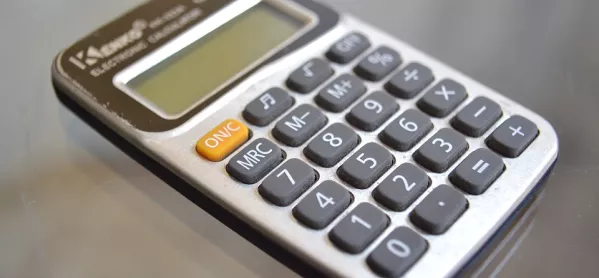When I first started teaching maths as a non-specialist, I immediately noticed that the students in front of me were lacking confidence. The class was a low-ability one and the students seemed to be missing the resilience needed to use their own brains to work out answers. They were quite open about the fact that they struggled with mental maths and liked the comfort of using a calculator - even if they were not using them correctly.
I came up with a simple idea to tackle the problem: ban calculators from all lessons. As you can imagine, this was not a popular decision.
To get the students on board, I needed a quick win to show them that they could do something hard without a calculator. I chose percentages, because this is an area of maths that I feel confident with - and I related the topic to money, as this is something students see the relevance of.
I broke things down into their simplest form. The students could all multiply and divide by 10, which meant that they could find 10 per cent of something. They could also find 1 per cent and 50 per cent. From here, it was a case of showing them that by using these numbers, they could find any percentage they needed.
A change in mentality
The next step was to secure this success and get students to challenge themselves and each other. I did this by asking them to find a percentage of a number that someone else in the class couldn’t find. This turned into students asking themselves: “can you do this?” And from there it became: “can you find something you cannot do?” This changed their mentality, so that the subject became more about trying things and finding things out.
Once students had proved to themselves that it was OK to give something a try, we started applying their new approach to calculator questions. We talked through the workings of problems and students applied the skills they had used in mental maths to work out how to answer these questions. Rather than using calculators to immediately find the answer, we wrote down the sequence of buttons that we would press on the calculator and we marked that. As a class, we would then use the calculator on the board to get the answer. I wanted to make sure that they knew the process of getting the answer, rather than focusing entirely on the solution itself. This helped students to understand that showing your working gets your marks.
Making progress
At some stage in every lesson, we would spend five minutes working on mental maths in one of the following areas: times tables, products, factors, adding or subtraction. As students improved, their willingness to tackle harder questions became more apparent.
As a result of these tactics, the students completed more questions on the GCSE non-calculator paper than previously. Their marks for this paper also became comparable to the calculator papers. However, the biggest improvement was that they started to use their calculators properly. They knew which buttons to press to get more marks. Finally, they were able to use their mental arithmetic skills to check the answers that they were putting down - they could make the judgement about whether it looked right. Progress at last!
Marc Faccini is assistant principal for achievement and intervention at Francis Combe Academy in Watford
Want to keep up with the latest education news and opinion? Follow Tes on Twitter and Instagram, and like Tes on Facebook

